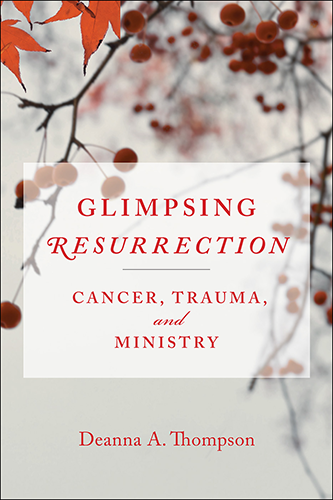books | Glimpsing Resurrection: Cancer, Trauma, and Ministry
How to buy the book:
In Glimpsing Resurrection, Deanna A. Thompson combines recent trauma research with compelling first-person narrative to provide insight into the traumatic dimensions of living with a serious illness. Her aim is to help those who are ill and those who care for and minister to them deepen their understanding of how best to offer support.
“The tendency for Christians to move almost immediately from death to proclamations of new life risks alienating those for whom healing and new life seem out of reach,” says Thompson. Glimpsing Resurrection focuses less on the “why” to help readers instead come to terms with the “how” of living with a serious disease. In particular, Thompson provides a framework and concrete suggestions for how to be a church where those who are undone by illness can be undone, as well as a place that can love and support them to hope.
“Finding space within the psalms, the story of Job, Jesus’ cry of God-forsakenness on the cross, and even Christ’s descent into hell helps us imagine how Christian communities can be spacious enough to acknowledge and hold those who are undone by illness,” Thompson says. “Only then does it become possible to identify the hope that can emerge from our not-yet-resurrection reality to imagine more in life today as well as in the life to come.”
From the foreword, by Willie James Jennings:
Undone and Redone
The makeup of our psyche or our systems of support really do not matter; we can be undone. Pain and suffering deconstructs us. It pulls us apart. This is the reality of being creatures created out of nothing. We have no inherent stability, no bodily mechanism that guarantees eternality. The truth of the creation and of every living creature is our contingency. We did not have to be; but because we are, we are loved by God, our creator. The real question that flows out of such knowledge is “How can we live with such knowledge?” This is a different question than questions of theodicy.
Theodicy questions revolve around the idea that God—as the all-powerful and controlling progenitor of all that exists—is in some fundamental way responsible for pain and suffering. This concept begets another tragic idea: that God observes our pain and suffering and could do something about it, if God wished to do so; but for reasons beyond our understanding, God does not act on our behalf. Theodicy questions circle these ideas, drawing energy from them. Such questions always drive people into endless, exhausting searches for answers that they will never find, because theodicy questions are always self-enclosed. Theodicy questions are bad questions. I write this not in any x / Foreword way intending to be insensitive or theologically elitist but fully recognizing the folly of questions that flow out of ideas of an abstract, all-powerful, and controlling God bound to realities of inexplicable and explicable human suffering and pain.

